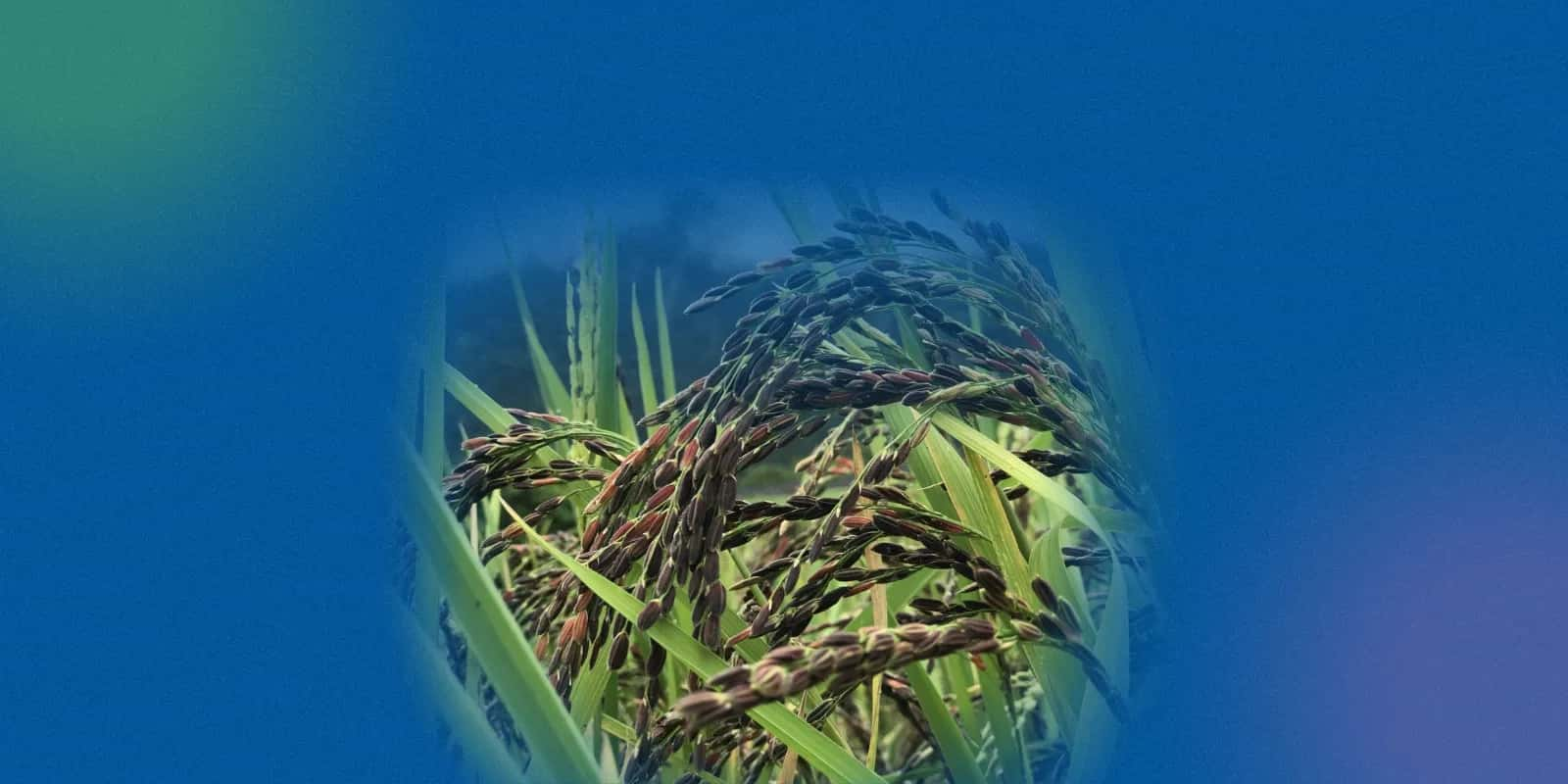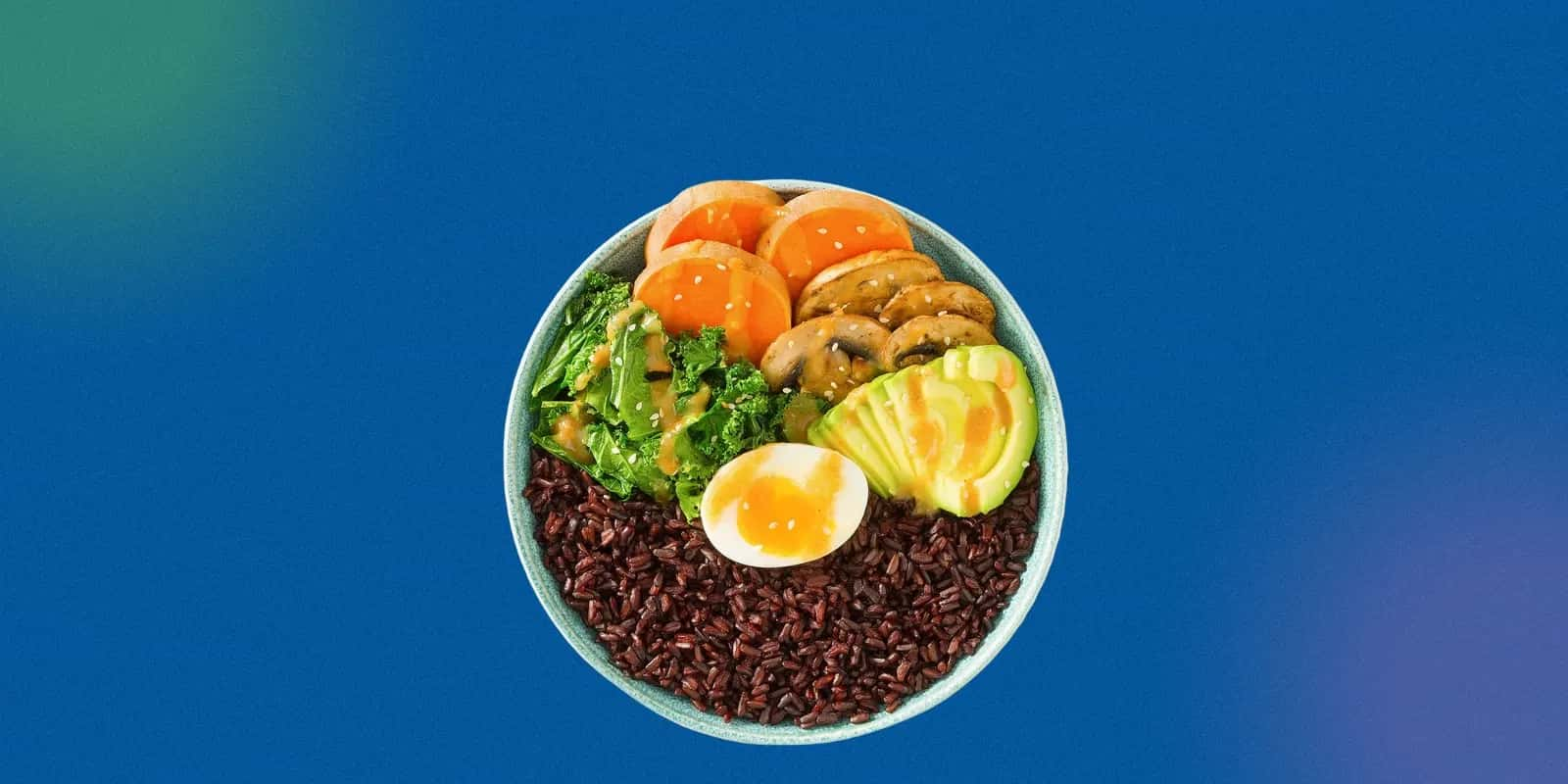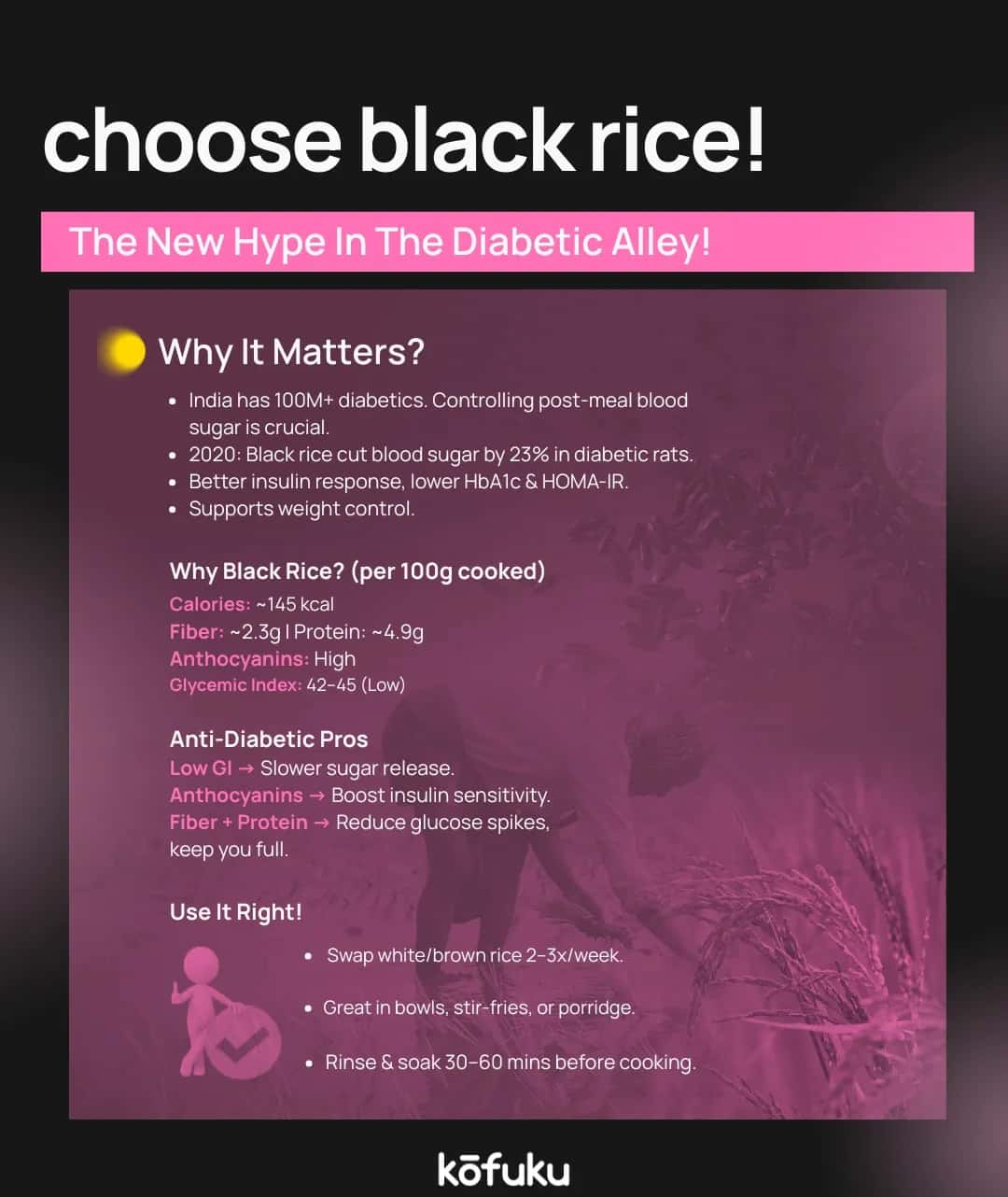Black Rice for Diabetes: A Nutritional Weapon Against High Blood Sugar

Introduction
Love to finish your meal with a bowl of rice, but have concerns about blood sugar? Here's some good news - black rice can be good for your blood sugar levels.
Rice is a dietary staple across many parts of India, but not all rice is created equal. In fact, recently, white rice has acquired a bad reputation as it can be bad for health and cause blood sugar level spikes.
This is why people who are watching their weight or those suffering from diabetes are advised to avoid white rice, which can be difficult for rice lovers.
But, in the fight against high blood sugar and diabetes, one ancient grain stands out: Black Rice, also known regionally as Karuppu Kavuni Rice or Kavuni Arisi.
With its unique deep purple hue, rich in antioxidants, and low glycaemic index (GI), black rice is emerging as a potentially powerful ally for metabolic health.
In this blog, you will learn more about what black rice is, the black rice GI index, the benefits of kuvani arisi rice, the disadvantages of karuppu kavuni rice, and answer the common question: Is black rice good for diabetes?
Beyond the Colour
Humans have been consuming white rice for generations. It has a high glycaemic index of 64 per cent and is dense in carbohydrates, one of the leading causes of diabetes and sugar level spikes.
People struggling to lose weight or living with diabetes are advised to stay away from white rice because of this. Brown rice, on the other hand, contains the same calories and carbohydrates as white rice and is slightly higher in nutrition due to its bran content.
Along with white and brown rice, one more variety of rice is famous in India, known as red rice. It is a popular staple in southern parts of India and has a low glycaemic index, is rich in antioxidants and minerals such as calcium, iron, magnesium, and zinc.
However, black rice, also known as the kavuni arisi, benefits diabetic people in an exceptional way. This variety of rice boasts a rich nutritional profile with high levels of fibre, antioxidants, and essential nutrients.
Why Black Rice May Be the Unsung Hero for Blood Sugar Control
Black rice is said to have a low glycaemic index, with a value lower than 50, and contains the same amount of antioxidants and nutrients as nuts and dried fruits.
The slow absorption of carbohydrates, the same antioxidants found in berries and dark coloured fruits, contributes to the rice’s deep black colour and also offers additional health benefits.

Top Nutritional Properties of Karuppu Kavuni Rice
Karuppu Kavuni rice offers numerous health benefits. Here are some reasons why black rice is considered beneficial for blood sugar control:
1. Low Glycaemic Index
Black rice has a lower GI than white rice. The lower the glycaemic index, the slower food is digested. Consequently, it causes a slow rise in blood sugar levels. This is particularly helpful for people on weight control diets or those with diabetes.
2. High Fibre Content
Fibre is a critical part of diabetes management, and black rice is a rich source of fibre. The rich fibre content helps slow down the absorption of sugar in the gastrointestinal tract and helps to manage blood sugar levels better.
3. Rich in Antioxidants
The deep black or purple colour of the black rice is a result of its rich antioxidant content, particularly anthocyanins. It also has anti-inflammatory effects, along with other benefits. Because of this, karuppu kavuni rice is good for blood sugar levels and cardiovascular health.
4. Nutrient Density
Organic black rice is good for diabetes because it's not only a good source of complex carbohydrates but also contains essential nutrients. It has dense amounts of vitamins, minerals, and phytonutrients that play an essential role in supporting overall health. This nutrient density is especially beneficial to people with type 2 diabetes.
5. Cardiovascular Benefits
Diabetes coexists with an increased risk of cardiovascular complications. Black rice’s glycemic index has been linked to cardiovascular benefits, including lower cholesterol levels.
What Science Says About Black Rice and Blood Sugar
Scientific research increasingly recognises black rice as a functional food. Animal and human studies suggest it may improve insulin sensitivity, reduce inflammation, and aid in weight reduction, all the key elements in managing type 2 diabetes and metabolic syndrome.
It's high fibre and antioxidant content supports digestive health, cardiovascular function, and may reduce the risk of non-alcoholic fatty liver disease.

Karuppu Kavuni Rice for Diabetes: A South Indian Supergrain
Known in Tamil Nadu and southern India as Karuppu Kavuni rice, it is particularly esteemed locally. It shares the same low GI, high fibre, and antioxidant-rich profile as the other black rice varieties and is often explicitly promoted for diabetic nutrition regimes.
Is Black Rice Good for Diabetics? What You Need to Know
Yes, black rice is generally a smart choice for diabetes, especially when consumed as part of a balanced diet. It's low GI and high fibre slows down glucose absorption, reducing postprandial spikes.
Experts suggest that incorporating black rice into a regular diet supports better glycaemic control and satiety, helping to manage weight and type 2 diabetes.
The Proof Is in the Pudding
The unique colour of the black rice is due to the presence of anthocyanins in the food grain. Anthocyanins are water-soluble pigments also found in foods such as blueberries, raspberries, and eggplants.
Anthocyanins are also great for protecting heart function. Black rice is rich in fibre, which helps slow the release of glucose in the blood, preventing sudden spikes in blood sugar levels.
Whether you're looking to boost your overall health or address specific health concerns, incorporating black rice into your diet is a delicious and effective way to achieve your goals. So, next time you are at a grocery store, you know which rice to put in your cart!

FAQs
Q. What is black rice, and how is it different from white rice?
A. Black rice, also known as forbidden rice, is a type of rice with a deep black or dark purple colour caused by its high anthocyanin content. This differs from white rice. In glycaemic index, antioxidant content, fibre, and nutrient content, black rice also gets the upper hand over white rice.
Q. Can black rice help manage diabetes or blood sugar levels?
A. Yes, black rice can be a beneficial addition to your diet for managing diabetes or blood sugar levels due to its low glycaemic index and high fibre content.
A low glycaemic index slows down the absorption of glucose, preventing rapid spikes in blood sugar levels, while fibre promotes satiety and helps regulate digestion.
Q. What nutrients make black rice beneficial for health?
A. Black rice is beneficial to health due to its high content of antioxidants, particularly anthocyanins. It is also rich in fibre, proteins, and several vitamins and minerals. It also has a low GI index, which can be particularly beneficial for diabetics.
Q. Is black rice safe for daily consumption?
A. Absolutely! Black rice is safe to consume every day as part of a balanced diet. Black rice is a nutritionally dense grain with diverse advantages. However, in moderation is the key, and it is wise to switch it with other whole grains.
Q. How can I incorporate black rice into my diet?
A. Black rice is easily adaptable to your diet by substituting it for white or brown rice in most dishes. It can be consumed in stir-fries, salads, or as a grain bowl base, in sushi, or as part of puddings and desserts.

Fad Diets – An In-Depth Guide to What’s Failing

Is Veganism a Healthy Choice or Just a Fad Trend?

What Is Dukan Diet and Who Is It For?

Diet and lifestyle: key to diabetes prevention

Potassium-Rich Diet Tips to Boost Your Nutrient Levels

The Surprising Link Between Your High-Salt Diet and Depression

The Sadhguru Diet - Myth or Fact?


